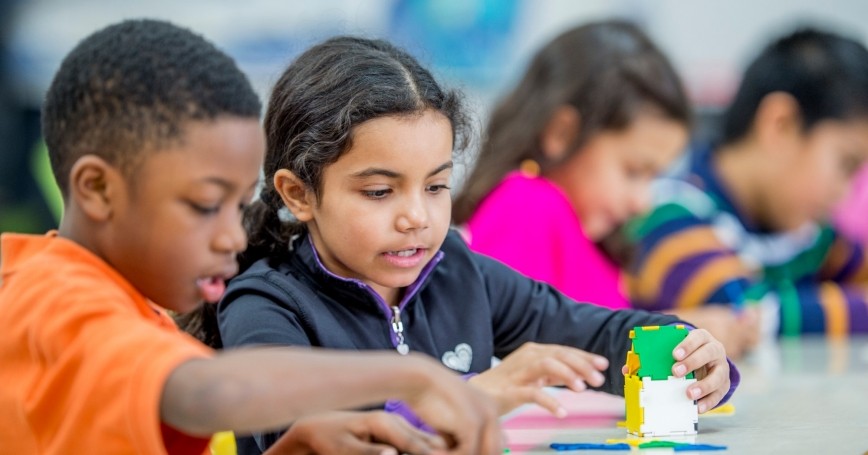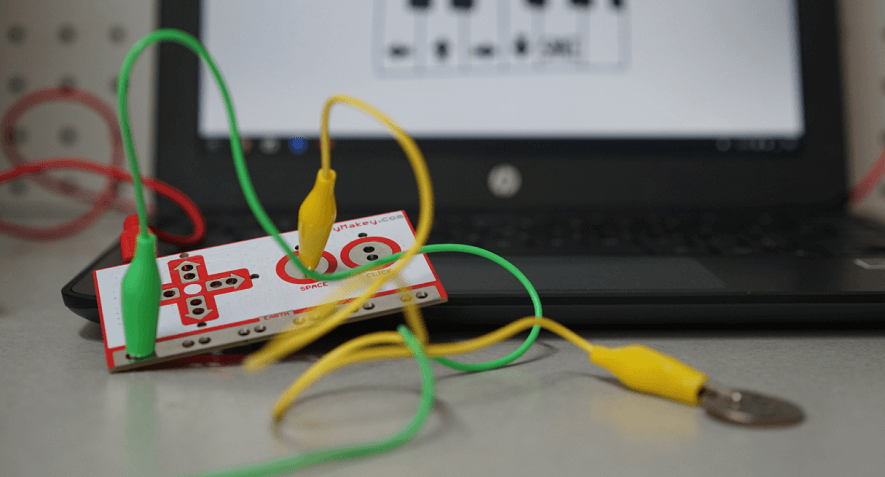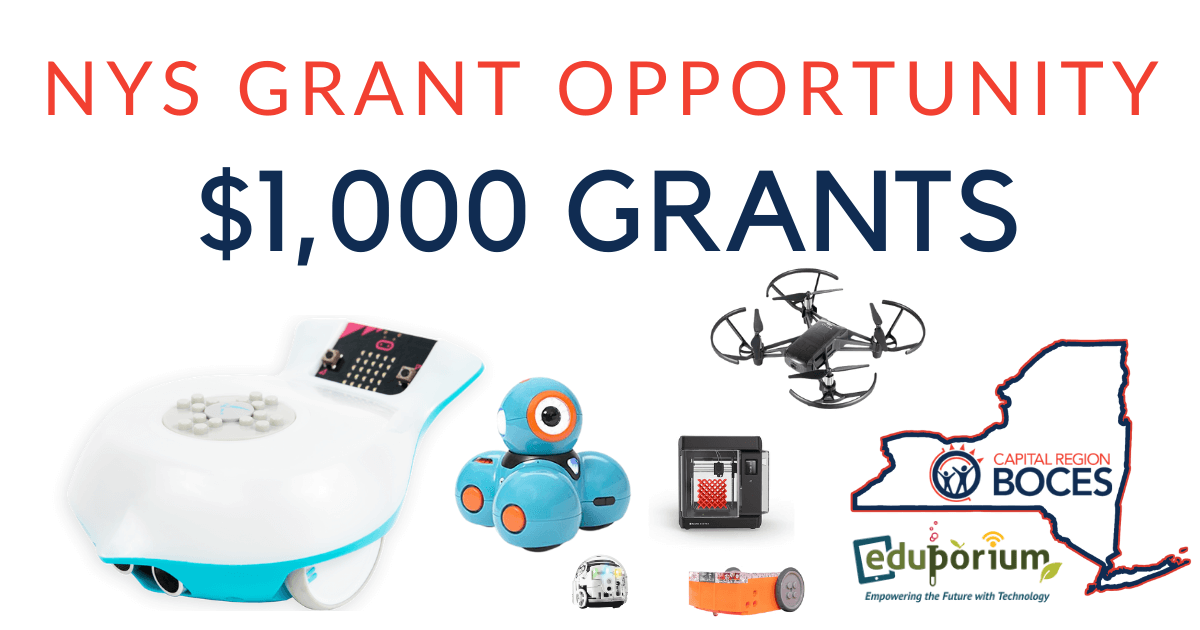Last August, we announced opportunities for educators in New York to apply for unique grants to address learning loss recovery. Centered on helping to address pandemic-induced gaps in both academic and social-emotional development, we worked with our partners from the DREAM Consortium to provide this offer. Recently, at the 2021 NYSCATE Annual Conference, we announced the two recipients. After months of finalizing the structure of the grant opportunity and evaluating deserving applications, we're pleased to announce that the two recipients are Anne Lotito-Schuh, a librarian from the Robert Frost Middle School in Deer Park, NY, and Margaret Fiorello, a makerspace manager at the Saint William the Abbot School in Seaford, NY!
How the grant came about.
Since opening the application in early August, we received dozens of deserving submissions. Thanks to our partners from the DREAM Consortium and our status as a BOCES-authorized reseller of STEAM and makerspace tools, we were able to provide this opportunity to better address learning loss and recovery. For background, the conception of this opportunity came in response to constant struggles for educators in returning to pre-pandemic learning. Knowing how hands-on, whole-child learning can help students better regulate their emotions and re-establish relationships, however, we collectively saw an opportunity to help teachers and students push past these roadblocks.
Any educator from New York State was eligible to apply for the grant. And, we were certainly impressed with the innovative ideas they had for addressing this extremely important topic in the classroom. Essentially, our decisions came down to a collaborative effort focused on educators with a demonstrated commitment to bettering academic and SEL experiences for students, those who were able to present a strong plan of action, and those with financial limitations within their school or district. Though others were equally deserving, we're thrilled to provide these awards to Anne and Margaret, who both met exactly what we were looking for.
A focus on social-emotional well-being.
We also made it a priority to focus on assisting school librarians and makerspace leaders, who often work hand in hand to create hands-on opportunities for active exploration and social-emotional development. Since both grant recipients work hard to facilitate active learning opportunities for students, it seemed like the perfect fit. As we constantly convey, we believe the power of hands-on learning, touch, and collaboration—some of the cornerstones of maker education—very much connect to social-emotional learning. And, as our recipients know, teamwork, relationship building, and productive failure are related to MakerEd as much as SEL.

Since many learning loss recovery efforts have involved focusing on lost social-emotional opportunities as much as academic development, we saw this opportunity to collaborate with our friends from the DREAM Consortium as the perfect chance to impact both. Now that we've announced the two recipients, we're excited to share their stories and plans with our community. Starting with Anne, she's planning to focus on encouraging students to become leaders and she's dubbed her project Makerspace Mentors. She's a middle school librarian but, currently, her eighth graders are returning there for the first time since sixth grade. In an effort to reconnect with them in-person, she's focusing on community, culture, and collaboration using MakerEd tools.
Anne's plan for learning loss recovery.
Anne plans to facilitate leadership and mentorship workshops for and interested students. Students who attend will learn how to use some of the EdTech tools she receives through the grant. More importantly, however, they'll learn to teach younger students how to use them as well. In short order, she hopes to promote student-led tech workshops throughout the school community and increase traffic in the school library—specifically resulting in students working on purposeful, collaborative, and fun projects. With the STEM products she'll receive, Anne is also aiming to create new opportunities for students to learn about coding. Knowing coding experiences help them build both hard and soft skills, she hopes to help them bolster success in and out of the classroom.
In order to help bring her vision to life, we'll be providing Anne and her students with some Ozobot Evo robots, Cue Robots, Cubelets kits, Makey Makey kits, Root Robot kits, and some additional robotics tools as well. Perfect for fostering critical thinking and creative problem solving skills as Anne hopes to do, her students will also have the chance to work together, build new relationships, discover what it means to be a leader in the school community, and work towards learning loss recovery. According to Anne, there's no shortage of motivated students in her middle school. And, it's amazing that they're so willing to learn about new technology to mentor the students coming up behind them.
How Margaret will approach learning loss recovery.
As for Margaret, she's seen how social-emotional and academic learning loss have necessitated a greater focus on interdisciplinary lessons. She also has a new appreciation for technology but, at the same time, knows it can't fully replace human interaction. Serving as the premise of this opportunity, we're happy to help her use technology to re-establish relationships. As their in-person school year continues, Margaret is always thinking about these cross-curricular connections and what EdTech helps make possible. She's planning to use her award to connect ELA and literature with other subjects, like history and technology.

We'll be providing Margaret with $1,000 worth of Makey Makey kits to use in these learning loss recovery projects. Margaret is particularly excited to use the Makey Makey with Scratch to help students tell stories and build empathy. Since empathy is so closely linked to SEL, it's a great way to help students rebuild some key soft skills. She also plans to illustrate the connection between overcoming trauma and how plots of a story unfold while highlighting conflicts and resolutions, which we can all probably easily tie to the pandemic. Students will present key parts of stories to their classmates so they, too, can learn. Plus, she'll do the same in history classes and have students create media projects to teach classmates about significant events using the Makey Makey and Scratch.
Putting plans into action.
Margaret also hopes to get her students thinking about historical events from other points of view so they can empathize. Her students also regularly meet with school counselors to work on SEL development. This project is definitely a great way for them to put what they talk about into practice. Plus, she sees an opportunity to capitalize on hands-on learning and reinforce some key values of the Maker Movement. We're happy to support Margaret and her students as they connect different academic subjects to SEL. Her commitment to addressing various types of learning loss is amazing and we wish her all the best!
Once again, we'd like to congratulate Anne and Margaret on receiving these grants! We know these STEAM tools will go a long way as they move past learning loss and towards learning recovery. We'd also like to thank all of the other educators who applied. Our team and our partners from the DREAM Consortium truly appreciate your interest. If you have questions about SEL, hands-on experiences, or learning loss, contact our team or watch our SEL webinar series! Follow us on Twitter and Instagram for more.






